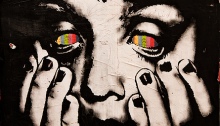No Escape: The Ramifications of Web 2.0 and Digital Connectivity
Building off of our dismal discussion from last week’s class, our readings by Robert Gehl and Preston C. Russett addressed some of the side-effects of our continuing corrosion of privacy. Gehl’s The Archive and the Processor: The Internal Logic of Web 2.0 outlined the cost of the instantaneous connectivity afforded to us via sites like Twitter and…









